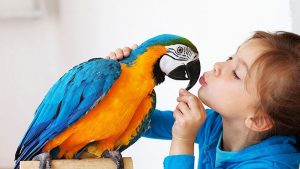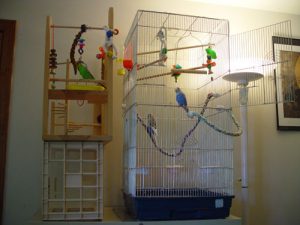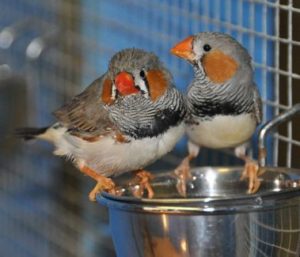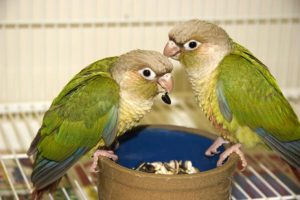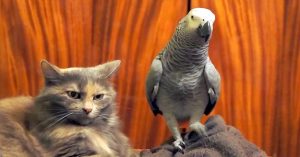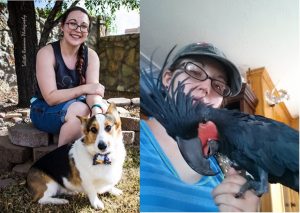When looking for a new companion animal, birds are always an adventurous choice. Unlike fish who are restricted to water, or dogs who keep their feet planted (mostly) on the ground, birds have the ability of flight and also have the unique adaptation of feathers instead of fur or scales. Their vibrant personalities match their unique physical appearance. This causes the members of the avian species to be very distinctive when compared to other types of pets, and it results in different types of challenges. Once we begin to consider a plumed pal, we must ask ourselves: how do we know if a bird is a right fit for our home? Fear not avian seeker, here are some tips to help you out!
Bird Care
The sky is the limit when it comes to pampering your bird, but there are a few basic items that must be considered before bringing a bird home. One important piece of equipment needed is a cage. A bird’s cage acts as a safe zone that belongs specifically to your bird(s). This is their space where they will feel comfortable and safe. Thus, it is important for the cage to be roomy enough that the bird remains comfortable while on a perch and while in flight. When picking a cage, you will need to consider the height, length, and width compared to the bird’s size, bar spacing on cage sides, and how many birds will be sharing this space. A fun way to determine the adequate length and width for a cage is to imagine the bird standing on the bottom of the cage with its wings spread to their full length, then visualize the bird turning in a full circle. The tips of the wings and the tail feathers should not touch any of the sides of the cage. Small cages produce the risk of birds getting their feathers stuck in the gaps between the bars which can damage the feathers and cause injury. When in doubt, go with a larger cage with greater total area! The vertical or horizontal bar spaces need to be sufficiently small so that a curious Polly will not fit their head through the space. When adopting multiple flock members, consider the previous cage sizing, and also make sure that there will be enough space for the birds so they can all be apart from the others while still not risking damage to their own feathers.
Have you ever heard of the term “bird brain?” This saying is typically reserved for someone who is easily scattered in their thoughts. The saying “bird brain” does have a grain of truth hidden in it. Birds can be some of the most intelligent animals on the planet, but they need to keep their mind active. The best way to sustain your bird’s entertainment is to provide the right kind of toys and perches to re-create their natural habitats. Colors, sounds, reflections, textures, and puzzles can provide all sorts of enrichment for a feathered companion. Providing an array of perches and toys and interchanging them once in a while will keep a birdie buddy happy and playful and it will keep their mind active.
As with most living things, your pet bird will also need to be fed daily and have access to water. Having their food and water separate in their cage will assist in keeping the bird’s food dry and the water clean. Luckily, most bird cages sold in stores come with both food and water dishes.
Your bird’s diet is a also very important factor to consider. Unlike wild birds who can forage for seeds, grains, and nuts, a companion bird is fully dependent on what you can offer them as their caregiver. It is important to read the nutrient information of pet bird seed and research blends that will meet your pet bird’s species requirements.
Picking the Right Type of Bird
Companion birds are commonly divided into two orders: Psittaciformes (parrots) and Passeriformes (song birds). Any pet bird in either order will make a wonderful addition to your family, so what matters is identifying a species that will meet exactly what you’re looking for in a feathered friend.
Parrots are exotic and curious creatures. Naturally intelligent, parrots are a joy to train and may even be able to repeat words and phrases. Many different species of parrots are available as companion birds, but as the bird’s size increases, the amount of money, time required to care for them, and longevity of the bird increases as well. As a first time bird owner, species such as a parakeet (budgie) or cockatiel are recommended for their personalities, size, and price. Depending on the amount of time you are able to spend with your parrot, a second bird of the same breed would make an excellent social companion.
Song birds are also wonderful birds to welcome into your home. Song birds include avians such as canaries, finches, and cooing doves. The majority of these little guys don’t care for much handling or human contact, however, there are exceptions where some may enjoy human cuddles. Song birds, as their name suggests, have musical vocals and may fill your home with sweet tweets, chirps, coos, and caws! If you think you would prefer to have a little flock of birds, song bird species typically flourish in homes where they participate in companionship with two, three, or more birds of their kind to form a flock.
Time
Dedication, schedules, and plenty of patience is key to owning birds. It is going to take a bit of time and effort for your new bird to become used to your presence. Birds are prey animals and are very skittish. This may cause it to take a few days before they are used to your presence. Once you all are comfortable with each other, it will become a ritual of consistency to offer fresh food and water at least once a day. Food and water bowls should also be cleaned frequently to prevent bacteria. The cage, toys and anything else that may have come in contact with bird waste should also be cleaned at least once a week. Molted feathers, waste, seed shells, splashed water, and the remains of toys are common litter found in the bottom of a bird’s cage that must be cleaned up. Birds of all species will produce a lot of dandruff and mess and the area around the cage will most likely need cleaning as well.
One major observation frequently made about birds is their unique sound. Their vocals can be sweet or very irritating. Many parrots can screech up to the volume of emergency sirens and if this occurs during sleeping hours it may be disturbing. Patience is necessary because you should not always scold the animal, but instead try to understand why they decided to start singing in the early hours. A bird’s biological clock is very strong and they may need to be “put to bed” at different times throughout the year depending on daylight hours.
In some cases, like with many parrot species, your bird buddy will need exercise time of an hour or more each day outside of their cage to truly stretch their wings. When your bird is out of the cage, a supervising eye is especially needed because of their curious nature. They may get themselves in some very challenging or destructive situations. With persistence, training, and veterinary advice, managing the effort of care for your bird will become a breeze.
Other Friends
A very important consideration to make before investing in birds is to respect other household members. Not all abodes are adequate in housing avians. If other house mates cannot handle the clamor that can possibly be made or if any other companion animals would be bothered by a frantic flutter, it may be best to reconsider. Many birds can become very sick, stressed, or destructive in homes not suited for them. Too many birds end up being surrendered due to incompatibility. Sometimes you do just need a trial period to see if Tweety and Sylvester can learn to adjust to each other, or if the situation should be reconsidered. For example, I personally cannot adopt a bird currently because I live with bird dogs who become very excited and agitated when sighting feathered fowl. I decided not to adopt currently because I fear my dogs may accidentally hurt the bird and I wish to avoid as much stress as possible for either animal. The good news is, if you currently decide it is best not to adopt today, circumstances do change and it may become possible one day!
Sometimes though, training and persistence can solve such a situation and if the other household members are neutral to their new feathered family member, then your birdie adventure may begin!
Ashley Gurnea, our Avian Editor, is a certified bird feeding specialist at Wild Birds Unlimited. A graduate from New Mexico State University, Ashley earned her bachelor degree in the field of Animal Science. She completed an internship at an exotic animal park, working with animals ranging from camels to porcupines and a variety of birds such as parrots and cockatoos. This love and curiosity of avians has led her to her current position at Wild Birds Unlimited in Las Cruces where she remains up to date with local wild feeder birds. Growing up in a home where animals have always been present, Ashley is now a self-proclaimed “Corgi Countess” due to her love and adoration for her tricolor Pembroke welsh corgi, Colin. Bring up anything corgi or bird related in a conversation and Ashley will be happy to share her many photos. Feel free to ask her about pet birds, and visit Wild Birds Unlimited for questions on wild birds! Ashley can be reached at ashleygurnea@gmail.com.

